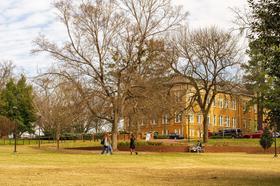For the 2026 school year, there are 2 public schools serving 105 students in Wynona School District. This district's average testing ranking is 2/10, which is in the bottom 50% of public schools in Oklahoma.
51±¬ÁĎs in Wynona School District have an average math proficiency score of 15% (versus the Oklahoma public school average of 25%), and reading proficiency score of 10% (versus the 27% statewide average).
Minority enrollment is 54% of the student body (majority American Indian), which is less than the Oklahoma public school average of 56% (majority Hispanic and American Indian).
Overview
This School District
This State (OK)
# Schools
2 Schools
1,793 Schools
# Students
105 Students
720,846 Students
# Teachers
6 Teachers
43,551 Teachers
Student-Teacher Ratio
18:1
18:1
Student By Grade
District Rank
Wynona School District, which is ranked within the bottom 50% of all 532 school districts in Oklahoma (based off of combined math and reading proficiency testing data) for the 2022-2023 school year.
Overall District Rank
#472 out of 537 school districts
(Bottom 50%)
(Bottom 50%)
Math Test Scores (% Proficient)
15%
25%
Reading/Language Arts Test Scores (% Proficient)
≤10%
27%
Science Test Scores (% Proficient)
≤20%
31%
Graduation Rate
(19-20)≥50%
79%
Students by Ethnicity:
Diversity Score
0.65
0.73
% American Indian
22%
11%
% Asian
n/a
2%
% Hispanic
n/a
20%
% Black
1%
8%
% White
46%
44%
% Hawaiian
n/a
1%
% Two or more races
31%
14%
All Ethnic Groups
District Revenue and Spending
The revenue/student of $26,952 is higher than the state median of $10,986. The school district revenue/student has grown by 16% over four school years.
The school district's spending/student of $26,762 is higher than the state median of $10,960. The school district spending/student has grown by 39% over four school years.
Total Revenue
$3 MM
$7,919 MM
Spending
$3 MM
$7,900 MM
Revenue / Student
$26,952
$10,986
Spending / Student
$26,762
$10,960
Best Wynona School District 51±¬ÁĎs (2026)
School
(Math and Reading Proficiency)
(Math and Reading Proficiency)
Location
Quick Facts
Rank: #11.
Wynona High School
(Math: <50% | Reading: <50% )
Rank:
Rank:
10/
Top 10%10
108 W 3rd
Wynona, OK 74084
(918) 846-2467
Wynona, OK 74084
(918) 846-2467
Gr: 9-12 | 26 students Student-teacher ratio: 13:1 Minority enrollment: 42%
Rank: #22.
Wynona Elementary School
(Math: 11-19% | Reading: ≤10%)
Rank:
Rank:
2/
Bottom 50%10
108 W 3rd
Wynona, OK 74084
(918) 846-2467
Wynona, OK 74084
(918) 846-2467
Gr: PK-8 | 79 students Student-teacher ratio: 20:1 Minority enrollment: 58%
Frequently Asked Questions
How many schools belong to Wynona School District?
Wynona School District manages 2 public schools serving 105 students.
What is the rank of Wynona School District?
Wynona School District is ranked #476 out of 532 school districts in Oklahoma (bottom 50%) based off of combined math and reading proficiency testing data for the 2022-2023 school year.
What is the racial composition of students in Wynona School District?
46% of Wynona School District students are White, 31% of students are Two or more races, 22% of students are American Indian, and 1% of students are Black.
What is the student/teacher ratio of Wynona School District?
Wynona School District has a student/teacher ratio of 18:1, which is higher than the Oklahoma state average of 17:1.
What is Wynona School District's spending/student ratio?
The school district's spending/student of $26,762 is higher than the state median of $10,960. The school district spending/student has grown by 39% over four school years.
Recent Articles

Zero Tolerance Policies in 51±¬ÁĎs Today
An updated look at zero tolerance policies in public schools, including current trends, costs, legal concerns, and what parents need to know now.

The Pros and Cons of Tracking in Schools Today
Explore the advantages and drawbacks of academic tracking in today’s public schools, including equity, outcomes, and what parents should consider.

Budgeting Hidden Costs of 51±¬ÁĎing in 2026
Learn how families budget for school lunch, after-school care, and activities, the hidden costs of public schooling in 2026.





